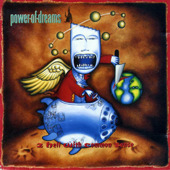
Richard Lester Meyers, better known by his stage name Richard Hell, is an American singer, songwriter, bass guitarist and writer.

Damnation is the concept of divine punishment and torment in an afterlife for sins that were committed, or in some cases, good actions not done on Earth.

Lonnie Rashid Lynn, known professionally as Common, is an American rapper and actor. He is the recipient of three Grammy Awards, an Academy Award, a Primetime Emmy Award, and a Golden Globe Award. At the age of 20, he signed with the independent label Relativity Records to release his debut studio album Can I Borrow a Dollar? (1992) along with its follow-ups, Resurrection (1994) and One Day It'll All Make Sense (1997). He maintained an underground following into the late 1990s, and achieved mainstream success through his work with the Black music collective, Soulquarians.

A Nightmare on Elm Street is an American supernatural slasher media franchise consisting of nine films, a television series, novels, comic books, and various other media. The franchise began with the film A Nightmare on Elm Street (1984), written and directed by Wes Craven. The overall plot of the franchise centers around the fictional character Freddy Krueger, the apparition of a former child killer who was burned alive by the vengeful parents of his victims, who returns from the grave to terrorize and kill the teenage residents of the fictional Springwood, Ohio in their dreams. Craven returned to the franchise to co-script the second sequel, A Nightmare on Elm Street 3: Dream Warriors (1987), and to write and direct Wes Craven's New Nightmare (1994). The films collectively grossed $472 million at the box office worldwide.

Freddy Krueger is a fictional character and the antagonist of the A Nightmare on Elm Street horror film franchise. Created by Wes Craven, he made his debut in Craven's A Nightmare on Elm Street (1984) as the malevolent spirit of a child killer who had been burned to death by his victims' parents after evading prison. Krueger goes on to murder his victims in their dreams, causing their deaths in the real world as well. In the dream world, he is a powerful force and seemingly invulnerable. However, whenever Freddy is pulled back into the real world, he has normal human vulnerabilities and can be destroyed. He is commonly identified by his burned, disfigured face, dirty red-and-green-striped sweater and brown fedora, and trademark metal-clawed, brown leather, right hand glove. This glove was the product of Krueger's own imagination, having welded the blades himself before using it to murder many of his victims, both in the real and dream worlds. Over the course of the film series, Freddy has battled several reoccurring survivors including Nancy Thompson and Alice Johnson. The character was consistently portrayed by Robert Englund in the original film series as well as in the television spin-off Freddy's Nightmares. The reboot portrays him as an undead groundskeeper accused of molesting the students.

Mob Rules is the tenth studio album by English rock band Black Sabbath, released in November 1981. It followed 1980's Heaven and Hell, and was the second album to feature lead singer Ronnie James Dio and the first with drummer Vinny Appice. Neither musician would appear on a Black Sabbath studio album again until the 1992 album Dehumanizer.
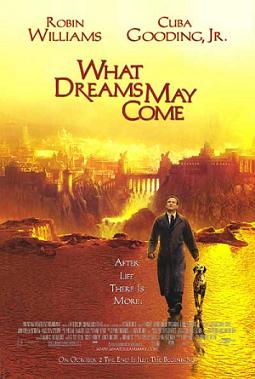
What Dreams May Come is a 1998 American fantasy drama film directed by Vincent Ward and adapted by Ronald Bass from the 1978 novel by Richard Matheson. Starring Robin Williams, Annabella Sciorra and Cuba Gooding Jr., it won the Academy Award for Best Visual Effects and the Art Directors Guild Award for Excellence in Production Design. It was also nominated for the Academy Award for Best Art Direction. The title is from a line in Hamlet's "To be, or not to be" soliloquy. The film received mixed reviews, with praise for its scenery but criticism for the plot. It was a box-office bomb, grossing only $75.4 million against a budget of $85‒90 million.

Third is the third studio album by American rock band Big Star. The sessions started at Ardent Studios in September 1974. Though Ardent created promotional, white-label test pressings for the record in 1975, a combination of financial issues, the uncommercial sound of the record, and lack of interest from singer Alex Chilton and drummer Jody Stephens in continuing the project prevented the album from ever being properly finished or released at the time of its recording. It was eventually released on March 18, 1978, by PVC Records.

The evil demon, also known as Deus deceptor, malicious demon, and evil genius, is an epistemological concept that features prominently in Cartesian philosophy. In the first of his 1641 Meditations on First Philosophy, Descartes imagines that a malevolent God or an evil demon, of "utmost power and cunning has employed all his energies in order to deceive me." This malevolent God or evil demon is imagined to present a complete illusion of an external world, so that Descartes can say, "I shall think that the sky, the air, the earth, colours, shapes, sounds and all external things are merely the delusions of dreams which he has devised to ensnare my judgement. I shall consider myself as not having hands or eyes, or flesh, or blood or senses, but as falsely believing that I have all these things."
Robert "Shep" Pettibone is an American record producer, remixer, songwriter and club DJ, one of the most prolific of the 1980s.
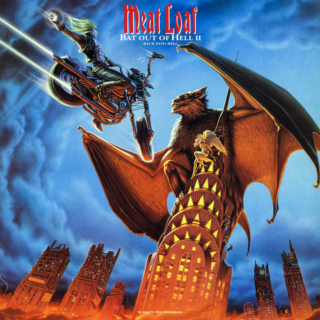
Bat Out of Hell II: Back into Hell is the sixth studio album by American rock singer Meat Loaf and the second one in the Bat Out of Hell trilogy, which was written and produced by Jim Steinman. It was released on September 14, 1993, sixteen years after Meat Loaf's first solo album Bat Out of Hell. The album reached number 1 in the United States, United Kingdom and Canada. Three tracks were released as singles, including "I'd Do Anything for Love ", which reached number 1 in 28 countries.
Dave Meegan is an Irish record producer, born in Dublin in 1963. Meegan is best known for his work with Marillion.
Power of Dreams are a Dublin based rock band, built around the vocals and songwriting of Craig Walker. Recently they garnered huge fan following thanks to their first show in India in Serampore, a former French colony.
A slowdown is an industrial action in which employees perform their duties but seek to reduce productivity or efficiency in their performance of these duties. A slowdown may be used as either a prelude or an alternative to a strike, as it is seen as less disruptive as well as less risky and costly for workers and their union. Striking workers usually go unpaid and risk being replaced, so a slowdown is seen as a way to put pressure on management while avoiding these outcomes. Other times slowdowns are accompanied by acts of sabotage on the part of workers to provide further disruption.

In Christian theology, Hell is the place or state into which, by God's definitive judgment, unrepentant sinners pass in the general judgment, or, as some Christians believe, immediately after death. Its character is inferred from teaching in the biblical texts, some of which, interpreted literally, have given rise to the popular idea of Hell. Theologians today generally see Hell as the logical consequence of rejecting union with God and with God's justice and mercy.
Russian political jokes are a part of Russian humour and can be grouped into the major time periods: Imperial Russia, Soviet Union and post-Soviet Russia. In the Soviet period political jokes were a form of social protest, mocking and criticising leaders, the system and its ideology, myths and rites. Quite a few political themes can be found among other standard categories of Russian joke, most notably Rabinovich jokes and Radio Yerevan.
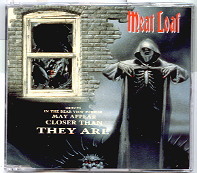
"Objects in the Rear View Mirror May Appear Closer Than They Are" is a song composed and written by Jim Steinman, and recorded by Meat Loaf. The song was released in 1994 as the third single from the album Bat Out of Hell II: Back into Hell and it reached number 38 on US's Billboard Hot 100, and number 26 in the UK Top 40. With its chart success, this song became the hit with the longest un-bracketed title at fifty-two characters as of 2007. The title is derived from the safety warning on car side mirrors in the US, "Objects in mirror are closer than they appear".
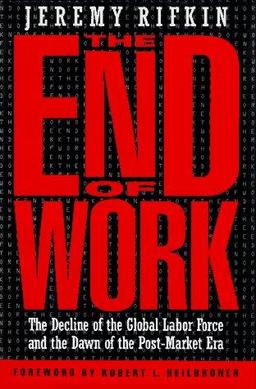
The End of Work: The Decline of the Global Labor Force and the Dawn of the Post-Market Era is a non-fiction book by American economist Jeremy Rifkin, published in 1995 by Putnam Publishing Group.
Booty v. Barnaby is the name of an English court case in 1687, in which a Mrs Booty brought a suit for slander against her neighbour, Captain Barnaby, who claimed that he had seen her deceased husband being driven into Hell.
